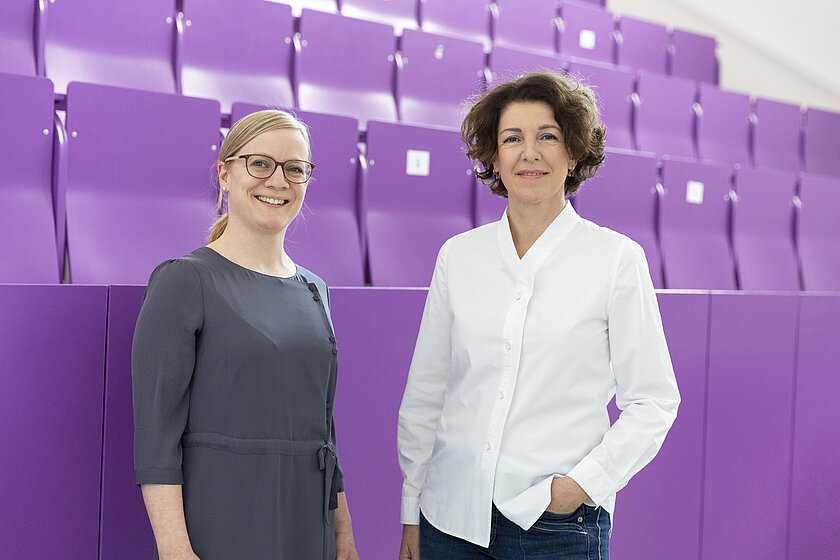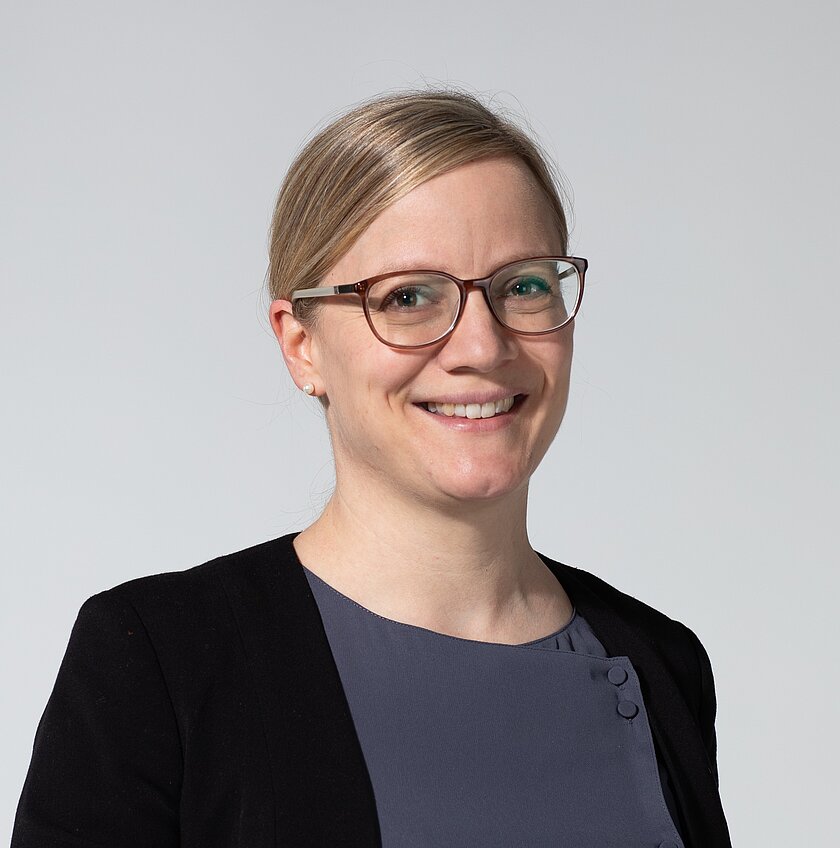[Translate to English:] Frauen.Machen.Wissenschaft
The structured qualification program Frauen.Machen.Wissenschaft (opens in a new window) (Women.Doing Science) supports female academic staff at HNU in particular in their individual career planning through information events on doctorates and professorships, advisory services and a wide range of workshops and training courses. Interested female employees can also network with experienced mentors from science and industry.
Inform, motivate and network: Frauen.Machen.Wissenschaft strengthens women in their professional development and career planning.

One Year Frauen.Machen.Wissenschaft
The kick-off in March 2021
The starting signal was given on March 30, 2021: Twenty curious faces showed up for the virtual kick-off of the new Women.Doing.Science program at HNU. They were welcomed by Dr. habil. Felicitas Meifert-Menhard, who conceives, organizes and manages the program in cooperation with the Women's Representative Prof. Dr. Claudia Kocian-Dirr. And so the participants of the kick-off, all of them female academic staff (WiMas) at HNU, were given a first insight into an offer that is unparalleled in the Bavarian HAW comparison: a structured qualification program specially tailored to the situation of female WiMas, which supports them in their individual career planning through information events, advisory services and a wide range of workshops and training courses.
Wide range of qualification, consulting and networking opportunities
Frauen.Machen.Wissenschaft (Women.Do Science) is made possible by HNU's renewed funding under the German Federal and State Governments' Program for Women Professors III. After the university had already been awarded the first round of funding and had appointed a total of three new female professors, the focus this time, in addition to the appointment of another female professor, was on female academic staff: How can offers be created that promote this target group and make them fit for a further career path up to professorship? Under the umbrella of Frauen.Machen.Wissenschaft (Women.Do Science), precisely such offers have been created since March of last year: from information events on doctorates and HAW professorships to workshops and seminars to individual counseling and virtual coffee breaks, there has been a wide range of qualification, counseling and networking opportunities in which more than 20 female scientific employees have already participated.
Focus on the scientific staff's own ideas and needs
In setting up the program, program director Dr. habil. Felicitas Meifert-Menhard paid particular attention to ensuring that the female scientists were able to contribute their own ideas and needs to the design of the workshops. To this end, the WiMas were asked in a survey at the kick-off in which areas they would like to see more training opportunities. The clear winner was the area of "Communication and Presentation", which is why this topic was represented with no less than two online workshops in the summer semester 2021: "Communication in Academia: (Conversational) Leadership & Self-Efficacy for Women" and "Appearing Confident, Communicating Effectively - Exclusively for Women". In the winter semester 2021/22, the focus was directed more towards the areas of "Self-leadership" and "Career planning", with the online workshops "Healthy self-leadership and resilient attitude", "Time management and time competence in academia" and "Shaping careers".
New target group: female lecturers
In the coming semesters, Frauen.Machen.Wissenschaft will continue to encourage young female scientists at HNU to actively shape their scientific careers and to develop professionally and personally. As a new target group, Frauen.Machen.Wissenschaft also increasingly supports female lecturers who gain teaching experience at HNU and thus qualify for later employment as HAW professors. The fact that the previous offer has been positively received by female WiMas is reflected in the statement from an anonymous survey on the advisory offer for WiMas at HNU in the past winter semester:
"I find the counseling offer [...] extraordinarily good. When I tell friends about it, I always get the feedback that this kind of approach is very unique and is not practiced like this at other universities."
Talking Partner: Dr. habil. Felicitas Meifert-Menhard

Dr. habil. Felicitas Meifert-Menhard (opens in a new window) is a research assistant for project management in the Professorinnenprogramm III. The doctor of English habilitated at the LMU on Future Narratives.
When I'm not doing research/work, ...
... I love spending time with my husband, our two daughters, and our cheeky black cat.
My current reading:
"Science" by Ian McEwan - my absolute favorite author.
My job description in three words:
Women.Do.Science!
This is how my desk would describe me:
Structured, minimalist, coffee addict.
It is not the women who need to change, but the structural conditions.
[1] What is the basic idea behind Frauen.Machen.Wissenschaft – and how was this idea translated into a program?
The initial idea came from Prof. Dr. Claudia Kocian-Dirr, who, after acquiring the funding in the After obtaining the funding for the Female Professors Program III, she turned her attention to female academic staff and asked herself what this target group needs and what services could be offered to support them on their way into academia. Based on this, I then developed a program and corresponding offers to support female academic staff in their work and in their career planning in a targeted manner.
The goal of the female professors program is, of course, to increase the proportion of women in professorships at universities of applied sciences. However, it was important to me from the outset that our program addresses all female academic staff - including those who may not (yet) have a professorship clearly in mind. Frauen.Machen.Wissenschaft is therefore also aimed at those who, after their work at HNU, are considering different perspectives in science and business.
In the meantime, the program has also evolved somewhat. We now also take other target groups into consideration: Master's students, female adjunct professors, and also the female professors to whom we offer individual coaching. This expansion has developed relatively organically because the positive feedback from female academic staff encouraged us to let other groups benefit from it as well.
Frauen.Machen.Wissenschaft really does address all women working in science at HNU. Although the focus is on the career stages from the master's degree onwards, we also have participation opportunities for female bachelor's students.
A pioneer program
Frauen.Machen.Wissenschaft is unique in this form: A structured quailfication program for female academic staff that covers predefined areas (communication, leadership, self-management) in each semester and in which a certificate can be earned is only available at HNU.
[2] Why is the topic of equality a concern for you - professionally, socially, but also personally?
I started studying in the USA, at Wellesley College in Massachusetts. In one of my first Studium Generale classes, I walked into the lecture hall - and there were only women sitting there. That was an AHA moment for me, a completely different atmosphere. The motto of Wellesley College is "Women who will make a difference in the world," and that thought also drives me in my position at HNU: the chance to make a difference and make a difference.
From the very beginning, equality has been an issue on my path to academia: what do women do differently than men, what are the conditions under which women learn and teach? The higher I climbed the academic ladder myself, the clearer it became to me that there are often double standards in academia. Women have a harder time being taken seriously in the academic community and still very often have to do more than men to get the same opportunities.
I myself have frequently been able to benefit from specific programs for the advancement of women, for example during the final phase of my habilitation, when I received a scholarship from the Bavarian Equal Opportunity Promotion Program. I would like to pass on these experiences and encourage people to take advantage of support on their way into science.
[3] What are currently the most serious obstacles for women in the science system - and where are the opportunities?
In my opinion, the biggest problem is a structural one: the science system is still designed for male careers and male biographies. In other words, you have to be permanently available, accessible and flexible in terms of your working hours and location, you have to publish non-stop and acquire third-party funding. This is not particularly convenient for women who take on social responsibility on the side or in their private lives - nor, by the way, for many men. However, they are more willing to meet these demands and, if necessary, to sacrifice something for them. Structural disadvantages simply affect women much more often than men - the keyword is leaky pipeline.
My favorite motto is therefore: "Change the system, not the women. It is so often suggested that women simply have to work harder, be tougher, complain less, give more full throttle - but the problem lies in the system. Working conditions need to change; the work-life balance needs to finally take hold in science in a sustainable way.
Of course, there are currently many, many programs and initiatives that address this problem. However, I believe that nothing will change until the fundamental structures behind them also change, for example with regard to fixed-term contracts. Uncertainty and precarious working conditions are a deterrent, and women with children or families in particular are more likely to look for a path outside academia because they are less willing to take these risks. There are role models, but they are often unapproachable. None of them admits to enjoying sitting with her child in the playground in the afternoon - such statements should simply be completely normal.
[Leaky Pipeline
refers to the phenomenon that the proportion of women in science gradually decreases with increasing qualification level: While women are still in the majority in many departments at the beginning of their studies and the ratio is relatively balanced in the doctoral and post-doctoral phase, the proportion of women decreases dramatically at the latest with professorships.
Currently, the proportion of female professors at HAWs in Bavaria is about 21%; at HNU, 25% of professors taught in the winter semester 21/22.
[4] To what extent is the situation for young female scientists at HAW different from that at universities?
At universities, the mid-level faculty is responsible for most of the teaching and does research and publishing on the side. At HAWs, academic staff members teach less frequently and do not necessarily pursue a doctorate. The involvement of young scientists in teaching is lacking at HAWs. I find this quite paradoxical, because if a professorship is sought, the candidate must prove that she has teaching experience and, in the case of a successful appointment, must also teach many, many hours per week. Women with families, in particular, who are interested in an appointment, then have to land teaching positions in addition to projects and doctorates in order to become eligible for an appointment. The "classic" research assistant at the university has it easier in this respect, because her job profile already covers everything that is needed for a later appointment. At HAW, the research assistants have to show more initiative.
Basically, the job profiles of our research assistants are very diverse: some primarily do project management, some do doctoral work - of course, this is more differentiated than at the university, where everyone does more or less the same thing: teach, go to conferences, publish.
[5] What did your own path to science look like and what would you possibly have wished for yourself on this path?
My path was rather classic: After my studies, I did my doctorate and was then offered a position in an EU research project, which eventually led to my habilitation. After that, I worked as a private lecturer and also held one or two professorships.
In the course of time, however, I realized that this no longer appealed to me so much. I have always enjoyed teaching, appreciated the contact with the students and received positive feedback from them. But publishing for the sake of publishing, acquiring third-party funding - more and more and more - at some point I no longer found that fulfilling, and so I switched to science management.
If I could have wished for anything, it would have been that I had received clearer and more structured advice earlier, or rather at the beginning of my scientific career: What are my options? Where can I go later? My experience is that many decisions are made very early on and that it is important to have certain milestones in mind on the way to a professorship, for example. I have studied abroad, but never completed a research stay. This lack of experience abroad at a university later proved to be one of the sticking points on the way to a permanent appointment as a professor. Beforehand, no one had ever told me, this is mandatory, do it! That's why I'm now offering exactly this kind of advice, to help female academic staff explore at an early stage what is important and what they should look out for.
[6] What experiences have you had so far at HNU and with Frauen.Machen.Wissenschaft?
My most important insight is how nice it is to work at a small university! In a very short time, I have met so many nice and helpful people here and immediately found contact persons for a wide variety of topics who have helped me and supported me. I find this helpfulness and appreciation, especially in the team but also beyond, really nice. Despite Corona, I always had the feeling that new employees were immediately actively integrated into the HNU community.
At Frauen.Machen.Wissenschaft, I have received very positive feedback so far. Even if not all WiMas can always find the time to take advantage of every offer, it is important to me that they feel well advised and have the opportunity to participate at any time.
[7] What advice can you give women on their way into academia?
My advice: Build networks early! Without contacts, it will be difficult. It's not necessarily enough to be good at what you do on your own - you have to know the right people. I have the feeling that this is generally more difficult for women, and it has never been that easy for me personally, for example, to socialize at the bar tables at conferences. A colleague once gave me the tip to make two new contacts per conference. That's great, of course. Women are taught a certain reserve at school, which can be a hindrance later on.
[8] Thinking in the medium and long term: What other goals does the program pursue, and what should be expanded or made permanent?
I would like to see the program become more permanent, so that more than just one generation of female scientists can be supported. It's always a pity when a lot of money, time and energy is invested in a project and it comes to nothing at the end of the program. That would be my wish, that the structured support of female scientific employees at HNU becomes a permanent task.
If the program becomes superfluous because there is parity everywhere and 50% of the professors at the universities are women - then that would be fine with me, of course. However, I fear that this will take some time. It would be particularly gratifying if a current female WiMa were to return to HNU as a professor in the future and pass on her experience - in keeping with the cascade model, in which representatives of each career stage can act as role models for the next generation. Role models are simply immensely important; they can show that there are paths and what they can look like.
In terms of services, we want to offer even more individual counseling and coaching for female scientists and professors at Frauen.Machen.Wissenschaft in the future so that we can meet their specific needs in a more targeted way.
[9] Time to dream: What has happened in five years with regard to equality and career opportunities for women?
There is less talk about equality and more action for equality. Equality is a bandwagon that many are jumping on - of course also because it is simply an important topic. But I still have the feeling that it often remains lip service. If, at some point, programs like Frauen.Machen.Wissenschaft no longer have to exist, then we will have done our job. So that would be my wish: that equality is done and lived, and not just talked about.







